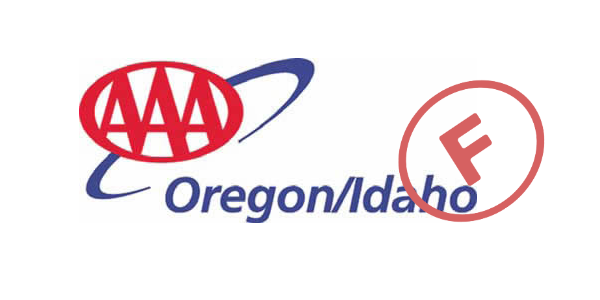The end of Oregon’s 2019 legislative session exposed some of the egregious corporate lobbying in Salem that blocks climate action – sometimes in public, but many times behind the scenes in the halls of the State Capitol. Boeing Corporation was one of the most visible bad actors, but there were other culpable companies – some of whom have a little-known history of working against climate progress. One of those companies is the American Automobile Association (AAA) of Oregon. Yes, the same AAA that you call for a lifeline when your car breaks down – but apparently that lifeline doesn’t extend to the climate emergency we’re currently experiencing.
AAA of Oregon has lobbied against state climate policies in Oregon and even sued the state to block climate progress. Details outlining some of AAA’s actions follow, but it’s important to note that sometimes it’s hard to publicly document everything that goes on behind closed doors in Salem. In this case, there are “smoking guns” like when AAA sued the State of Oregon to block electric vehicle rebates as well as more circumstantial evidence pointing to AAA’s broader anti-environment efforts.
While these public actions likely only scratch the surface of AAA of Oregon/Idaho's involvement, there’s more than enough outlined below to demand accountability. On both the national and state levels, AAA has previously been called out for its anti-environmental playbook – with the full details here. In fact, an alternative roadside assistance company was even established here in Portland, Oregon, largely in response to AAA’s history of anti-environmental antics. Yet AAA continues to disappoint and block climate action, while claiming to represent the interests of their membership.
AAA’s efforts to block climate progress in Oregon
Most recently, AAA lobbied against the Clean Energy Jobs bill, but AAA has also worked to prevent Oregon’s signature clean fuels legislation as well as electric vehicle rebates.

Sued the State of Oregon to block rebates for electric vehicles
As part of the 2017 transportation package, Oregon established an electric vehicle rebate program to save Oregonians up to $5,000 on the purchase or lease of an electric vehicle. Under the program, all Oregonians can receive up to $2,500 for the purchase or lease of an electric vehicle, and low- and moderate-income Oregonians can save an additional $2,500 on an electric vehicle. The program was designed to encourage higher adoption of zero-emission vehicles, reducing air pollution and advancing progress toward the state’s greenhouse gas reduction goals. Despite these benefits, AAA tried to put the kibosh on the program.
AAA not only lobbied legislators against funding for the program, but after the Legislature passed the transportation package with the program included, AAA sued the state to block the program. The Oregon Supreme Court rejected AAA’s arguments and found that funding for the electric vehicle rebate program should go forward. Even though the state won the lawsuit, AAA’s actions delayed full implementation of the program, causing nearly $13 million in potential electric vehicle rebates to go unused.
Lobbied against Clean Energy Jobs
 The Clean Energy Jobs bill (HB 2020) would have made oil companies and other big polluters pay for their climate pollution while providing funds for clean energy and transportation projects in communities across Oregon. In addition to lobbying behind the scenes to undermine the bill, AAA testified with “concerns and questions” about HB 2020. One of those “concerns” surrounded what they termed a “laundry list” of requirements for how funds generated by the program would invested in transportation projects across the state. That “laundry list” included, among other things, direction to:
The Clean Energy Jobs bill (HB 2020) would have made oil companies and other big polluters pay for their climate pollution while providing funds for clean energy and transportation projects in communities across Oregon. In addition to lobbying behind the scenes to undermine the bill, AAA testified with “concerns and questions” about HB 2020. One of those “concerns” surrounded what they termed a “laundry list” of requirements for how funds generated by the program would invested in transportation projects across the state. That “laundry list” included, among other things, direction to:
- Prioritize projects that benefit impacted communities [those communities most at risk of being disproportionately impacted by climate change, including frontline communities in rural and urban areas]
- Complement efforts to achieve and maintain local air quality
- Provide opportunities for Indian tribes, members of impacted communities and businesses owned by women or members of minority groups to participate in and benefit from statewide efforts to reduce greenhouse gas emissions
- Make use of domestically produced products
- Promote low carbon economic development opportunities and the creation of jobs that sustain living wages
(See Section 29 of HB 2020 (2019) Introduced)
Not only did AAA attack these important provisions aimed at promoting a clean and equitable transportation system, but their actions also more generally cast doubt on embracing transportation as a key part of the state’s strategy to address climate change. These actions fly in the face of the reality that emissions from the transportation sector are the largest source of Oregon’s greenhouse gas emissions – and still growing every year.
Opposed the Clean Fuels program
Oregon’s Clean Fuels program requires the gradual reduction of global warming pollution from fuels used in Oregon, by 10 percent over 10 years. In its first two years, the Clean Fuels Standard reduced climate pollution by more than 1.7 million tons, the equivalent of taking nearly 365,000 cars off the road for an entire year. Yet, AAA tried to stop the program. AAA submitted testimony opposing the bill (SB 488) that was needed to extend the Department of Environmental Quality’s authority to implement a clean fuels program. The bill failed to move forward in the face of opposition, but two years later the Oregon Legislature passed Senate Bill 324 (2015) allowing DEQ to implement the Clean Fuels Program.
As outlined above, AAA has earned a Triple “F” from us on climate policy in Oregon.
What you can do
Tell AAA that it’s time to do the right thing and stop blocking climate action progress in Oregon. Over the next few weeks, we'll be asking AAA of Oregon some tough questions, and encouraging you to do the same.
Email the CEO
Tell Tim Morgan to support meaningful climate progress or get out of the way.
Climate Solutions does not represent the American Automobile Association (AAA), AAA Oregon/Idaho, CSAA Insurance Group, or Better World Club, Inc. No entity has paid Climate Solutions to be included in or omitted from this post. All trademarks and logos are the property of their respective owners, and any use of copyrighted materials in Climate Solutions communications represents "fair use" pursuant to Section 107 of the U.S. Copyright Act.





